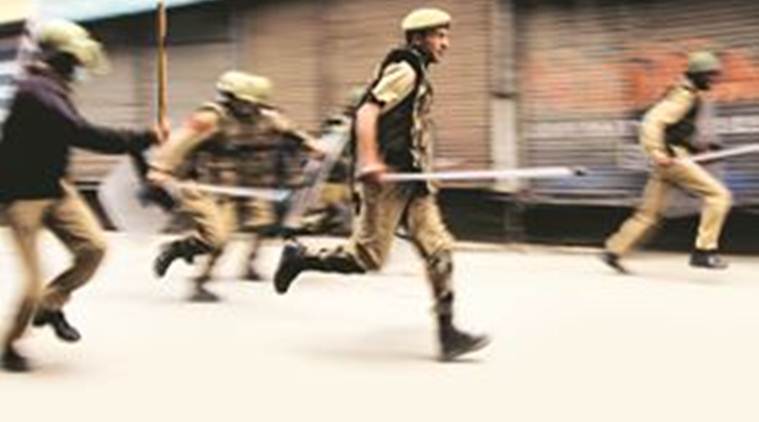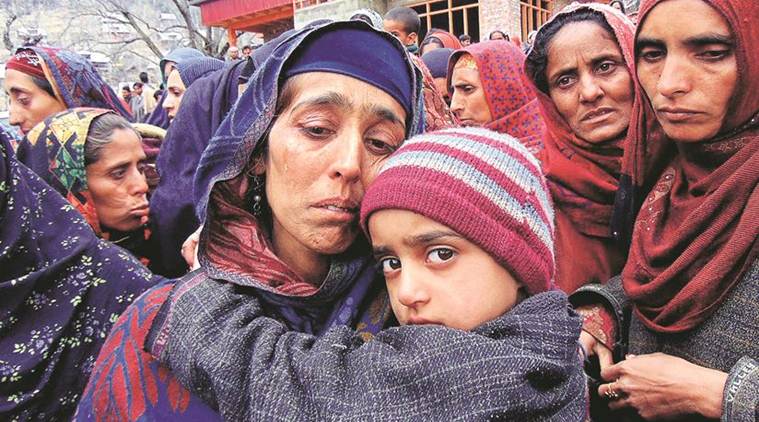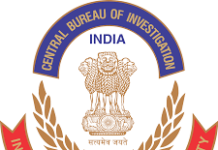
He works at a saw mill in south Kashmir’s Tral, carrying logs from morning till evening. A month ago, he was a Special Police Officer (SPO) with the J&K Police. He quit his job, he says, after militant threats and a failed attempt on the life of an SPO in his village. Now he wants to hide; he doesn’t want his name out or his face seen. With militants leaving eight SPOs dead in Kashmir this year, he wants to be forgotten for a while.
“Nothing is more precious than life,” the 32-year-old says. “I didn’t want to live in fear. I didn’t want any harm to my family.”
Contractual employees who, till a few days ago, earned a paltry Rs 6,000 a month, the ill-paid, ill-trained SPOs form the unacknowledged backbone of the police force in the Valley. For the first time, the 30,000 men and women — bolstering a police force with duties ranging from fighting terrorism to maintaining law and order, and stretched at a strength of 90,000 — are being targeted specifically by militants. With at least four of the eight who died shot inside their homes in South Kashmir, there have been more than 30 public resignations, and reports of at least three joining militant ranks.
On October 1, one of these SPOs, who had decamped with eight weapons from the official residence of a PDP MLA, emerged on social media posing next to Hizbul Mujahideen militants.
While the authorities continue to deny this, there have been reports of SPOs resigning especially from the four violence-prone districts of South Kashmir — Shopian, Pulwama, Kulgam and Anantnag.
A rattled Centre, which is attempting to organise panchayat and civic elections in the Valley from October 8, has announced a hike in the honorarium — from Rs 6,000 to Rs 12,000 — for SPOs who had spent more than five years in the force. The salary of a constable, the lowest-ranked policeman, in comparison, is Rs 23,000.
The J&K Police recently held a crowd-funding campaign for over 500 SPOs killed in counter-insurgency operations and militant attacks since 1996. All that the campaign managed to generate was Rs 6.54 lakh.
The Jammu and Kashmir Police Act says an SPO may be appointed “when it shall appear that any unlawful assembly or riot or disturbance of peace has taken place or may be reasonably apprehended and that the police force ordinarily employed for preserving the peace is not sufficient….”
It was in 1996, during the reign of the Farooq Abdullah-led National Conference, that the government first appointed SPOs to deal with militancy. Offered Rs 3,000 a month, they were to be absorbed into the police force after three years, provided they showed “excellent performance” in counter-insurgency operations.
Unlike regular policemen, the salary of SPOs comes from the Union Home Ministry’s Security Related Expenditure. It is the ministry that takes a call on any changes to this remuneration, with the state government having little say in it.
Initially, the SPOs were appointed directly by superintendents of police without any screening. In 2016, in the wake of the protests triggered by Hizbul Mujahideen commander Burhan Wani’s killing, the Union Home Ministry announced that 10,000 SPOs would be recruited through District Level Screening Committees headed by respective deputy commissioners.
Any man or woman between the ages of 18 and 28 is eligible to apply. The candidate should have passed Class 10 and needs to clear physical tests conducted by the recruiting body. While the men have to run 1,600 metres in no more than 6 minutes and 15 seconds, women candidates must complete at least 1,000 metres in that time.
While male SPOs are involved in both counter-insurgency and law and order duties, women SPOs are deployed for law and order and hence have not been attacked by militants so far. However, of late, militants have issued threats to women SPOs too, asking them to resign from their jobs, with at least one putting in her papers.
Unlike now, for many years, the only attack on SPOs was the ridicule they faced during anti-government protests, including taunts from protesters on the meagre compensation they got for the job they did: “Panda shath ti bati (Rs 1,500 and rice)”.
 Mother, son of SPO Mohammed Yousuf, who was killed in March. (Express Photo by Shuaib Masoodi)
Mother, son of SPO Mohammed Yousuf, who was killed in March. (Express Photo by Shuaib Masoodi)
Ironically, it is the mention of the clause “excellent performance in counter-insurgency operations” in their service rules that has landed SPOs in the cross-hairs of militants. They are being targeted for being “the primary source of intelligence collection” for police. Police officials claim to have intercepted a militant communication from across the border seeking that SPOs absorbed into the regular police force and promoted as constables be targeted.
For the militants, the SPOs are not just “obvious” but also soft targets. A senior police officer admits an SPO is ‘special’ only in name. While at the forefront of counter-insurgency operations, they don’t even get proper training, he says. “They get a basic seven-day training, only on how to wear a uniform and how to salute officers. Those in counter-insurgency operations get another short course on weapon handling. It is not even a basic course in weapons’ training.”







